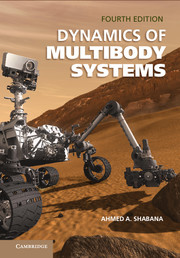Book contents
- Frontmatter
- Dedication
- Contents
- PREFACE
- 1 INTRODUCTION
- 2 REFERENCE KINEMATICS
- 3 ANALYTICAL TECHNIQUES
- 4 MECHANICS OF DEFORMABLE BODIES
- 5 FLOATING FRAME OF REFERENCE FORMULATION
- 6 FINITE-ELEMENT FORMULATION
- 7 THE LARGE DEFORMATION PROBLEM
- 8 CONCEPTS AND ESSENTIAL DETAILS
- APPENDIX: LINEAR ALGEBRA
- References
- Index
8 - CONCEPTS AND ESSENTIAL DETAILS
Published online by Cambridge University Press: 05 June 2014
- Frontmatter
- Dedication
- Contents
- PREFACE
- 1 INTRODUCTION
- 2 REFERENCE KINEMATICS
- 3 ANALYTICAL TECHNIQUES
- 4 MECHANICS OF DEFORMABLE BODIES
- 5 FLOATING FRAME OF REFERENCE FORMULATION
- 6 FINITE-ELEMENT FORMULATION
- 7 THE LARGE DEFORMATION PROBLEM
- 8 CONCEPTS AND ESSENTIAL DETAILS
- APPENDIX: LINEAR ALGEBRA
- References
- Index
Summary
This chapter provides explanations of some of the fundamental issues addressed in this book. It also provides detailed derivations of some of the important equations presented in previous chapters. The first two sections of this chapter show the detailed derivation of the quadratic velocity centrifugal and Coriolis force vector of Eq. 149 of Chapter 5. The final expression of Eq. 149 of Chapter 5 is obtained using two different approaches; the kinetic energy and the virtual work. It is also shown in Section 3 of this chapter how a general expression of these forces that is applicable to any set of orientation parameters can be obtained. This is the expression used in the generalized Newton–Euler equations presented in Chapter 5 of the book. The generalized centrifugal and Coriolis inertia forces associated with any set of orientation parameters including Euler angles can be obtained from the forces that appear in the Newton–Euler equations using a simple velocity transformation.
Understanding the finite element floating frame of reference formulation presented in Chapter 6 of this book requires a good understanding of the concept of the parallel axis theorem used in rigid body dynamics. The use of the parallel axis theorem is required in rigid body dynamics when the bodies have complex geometric shapes that are characterized by slope discontinuities.
Information
- Type
- Chapter
- Information
- Dynamics of Multibody Systems , pp. 339 - 352Publisher: Cambridge University PressPrint publication year: 2013
